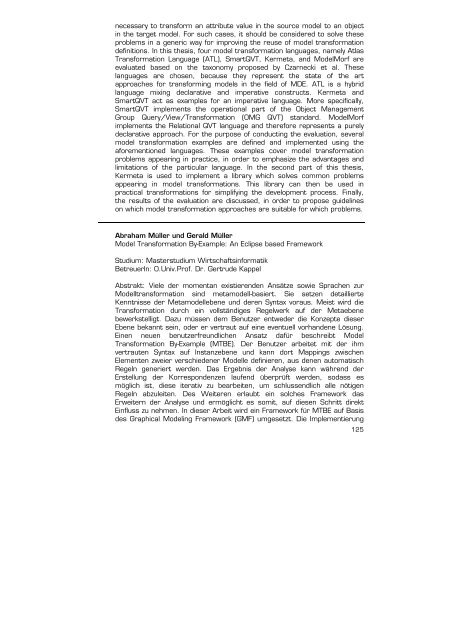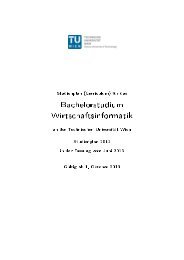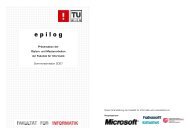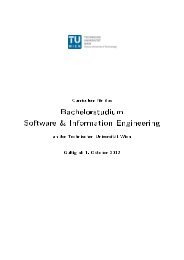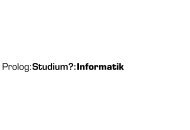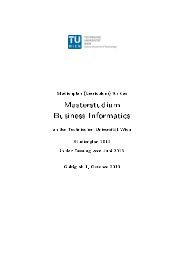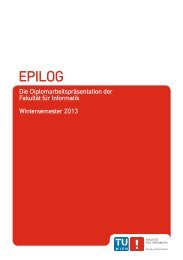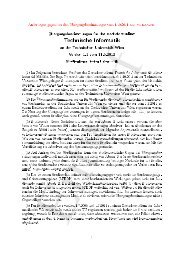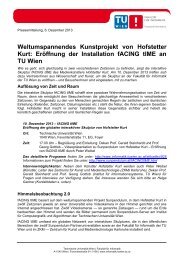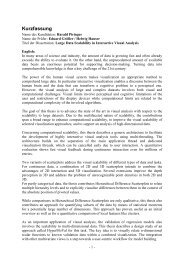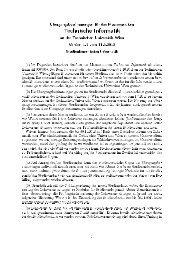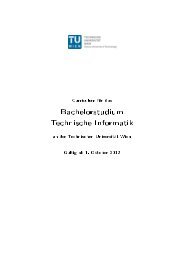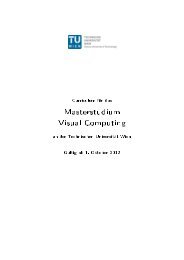e p i l o g - Fakultät für Informatik, TU Wien
e p i l o g - Fakultät für Informatik, TU Wien
e p i l o g - Fakultät für Informatik, TU Wien
Erfolgreiche ePaper selbst erstellen
Machen Sie aus Ihren PDF Publikationen ein blätterbares Flipbook mit unserer einzigartigen Google optimierten e-Paper Software.
necessary to transform an attribute value in the source model to an object<br />
in the target model. For such cases, it should be considered to solve these<br />
problems in a generic way for improving the reuse of model transformation<br />
definitions. In this thesis, four model transformation languages, namely Atlas<br />
Transformation Language (ATL), SmartQVT, Kermeta, and ModelMorf are<br />
evaluated based on the taxonomy proposed by Czarnecki et al. These<br />
languages are chosen, because they represent the state of the art<br />
approaches for transforming models in the field of MDE. ATL is a hybrid<br />
language mixing declarative and imperative constructs. Kermeta and<br />
SmartQVT act as examples for an imperative language. More specifically,<br />
SmartQVT implements the operational part of the Object Management<br />
Group Query/View/Transformation (OMG QVT) standard. ModelMorf<br />
implements the Relational QVT language and therefore represents a purely<br />
declarative approach. For the purpose of conducting the evaluation, several<br />
model transformation examples are defined and implemented using the<br />
aforementioned languages. These examples cover model transformation<br />
problems appearing in practice, in order to emphasize the advantages and<br />
limitations of the particular language. In the second part of this thesis,<br />
Kermeta is used to implement a library which solves common problems<br />
appearing in model transformations. This library can then be used in<br />
practical transformations for simplifying the development process. Finally,<br />
the results of the evaluation are discussed, in order to propose guidelines<br />
on which model transformation approaches are suitable for which problems.<br />
Abraham Müller und Gerald Müller<br />
Model Transformation By-Example: An Eclipse based Framework<br />
Studium: Masterstudium Wirtschaftsinformatik<br />
BetreuerIn: O.Univ.Prof. Dr. Gertrude Kappel<br />
Abstrakt: Viele der momentan existierenden Ansätze sowie Sprachen zur<br />
Modelltransformation sind metamodell-basiert. Sie setzen detaillierte<br />
Kenntnisse der Metamodellebene und deren Syntax voraus. Meist wird die<br />
Transformation durch ein vollständiges Regelwerk auf der Metaebene<br />
bewerkstelligt. Dazu müssen dem Benutzer entweder die Konzepte dieser<br />
Ebene bekannt sein, oder er vertraut auf eine eventuell vorhandene Lösung.<br />
Einen neuen benutzerfreundlichen Ansatz da<strong>für</strong> beschreibt Model<br />
Transformation By-Example (MTBE). Der Benutzer arbeitet mit der ihm<br />
vertrauten Syntax auf Instanzebene und kann dort Mappings zwischen<br />
Elementen zweier verschiedener Modelle definieren, aus denen automatisch<br />
Regeln generiert werden. Das Ergebnis der Analyse kann während der<br />
Erstellung der Korrespondenzen laufend überprüft werden, sodass es<br />
möglich ist, diese iterativ zu bearbeiten, um schlussendlich alle nötigen<br />
Regeln abzuleiten. Des Weiteren erlaubt ein solches Framework das<br />
Erweitern der Analyse und ermöglicht es somit, auf diesen Schritt direkt<br />
Einfluss zu nehmen. In dieser Arbeit wird ein Framework <strong>für</strong> MTBE auf Basis<br />
des Graphical Modeling Framework (GMF) umgesetzt. Die Implementierung<br />
125


